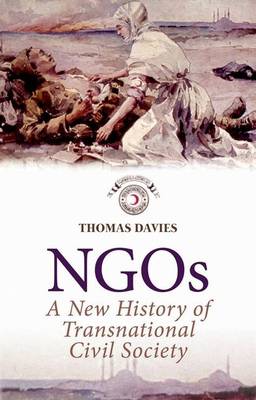
Door een staking bij bpost kan je online bestelling op dit moment iets langer onderweg zijn dan voorzien. Dringend iets nodig? Onze winkels ontvangen jou met open armen!
- Afhalen na 1 uur in een winkel met voorraad
- Gratis thuislevering in België vanaf € 30
- Ruim aanbod met 7 miljoen producten
Door een staking bij bpost kan je online bestelling op dit moment iets langer onderweg zijn dan voorzien. Dringend iets nodig? Onze winkels ontvangen jou met open armen!
- Afhalen na 1 uur in een winkel met voorraad
- Gratis thuislevering in België vanaf € 30
- Ruim aanbod met 7 miljoen producten
Zoeken
€ 60,45
+ 120 punten
Omschrijving
In the first historical account of international NGOs, from the French Revolution to the present, Thomas Davies places the contemporary debate on transnational civil society in context. In contrast to the conventional wisdom, which sees transnational civil society as a recent development taking place along a linear trajectory, he explores the long history of international NGOs in terms of a cyclical process characterized by three major waves: the era to 1914, the inter-war years, and the period since the Second World War. The breadth of transnational civil society activities explored is unprecedented in its diversity, from business associations to humanitarian organizations, peace groups to socialist movements, feminist organizations to pan-nationalist groups. The geographical scope covered is also extensive, and the analysis is richly supported with reference to a diverse array of previously unexplored sources. By revealing the role of civil society rather than governmental actors in the major trans- formations of the past two-and-a-half centuries, this book is for anyone interested in obtaining a new perspective on world history. The analysis concludes in the second decade of the twenty-first century, providing insights into the trajectory of transnational civil society in the post-9/11 and post-financial crisis eras.
Specificaties
Betrokkenen
- Auteur(s):
- Uitgeverij:
Inhoud
- Aantal bladzijden:
- 301
- Taal:
- Engels
Eigenschappen
- Productcode (EAN):
- 9780199387533
- Verschijningsdatum:
- 1/11/2014
- Uitvoering:
- Hardcover
- Formaat:
- Genaaid
- Afmetingen:
- 146 mm x 225 mm
- Gewicht:
- 508 g

Alleen bij Standaard Boekhandel
+ 120 punten op je klantenkaart van Standaard Boekhandel
Beoordelingen
We publiceren alleen reviews die voldoen aan de voorwaarden voor reviews. Bekijk onze voorwaarden voor reviews.











